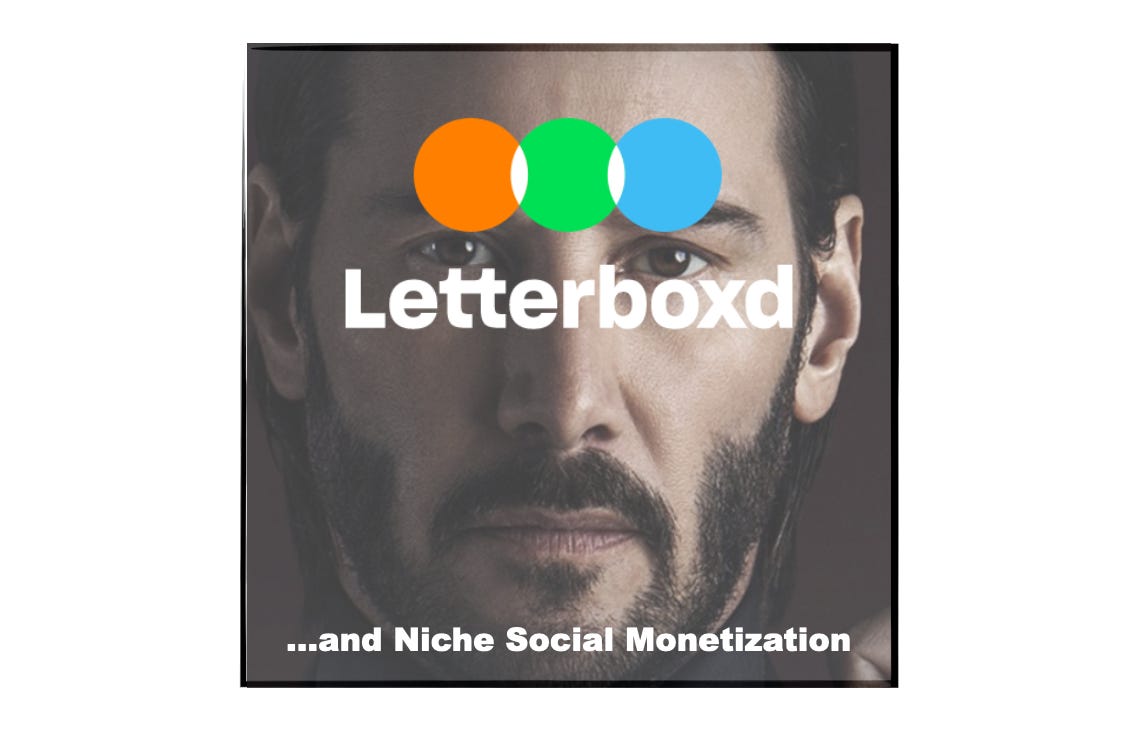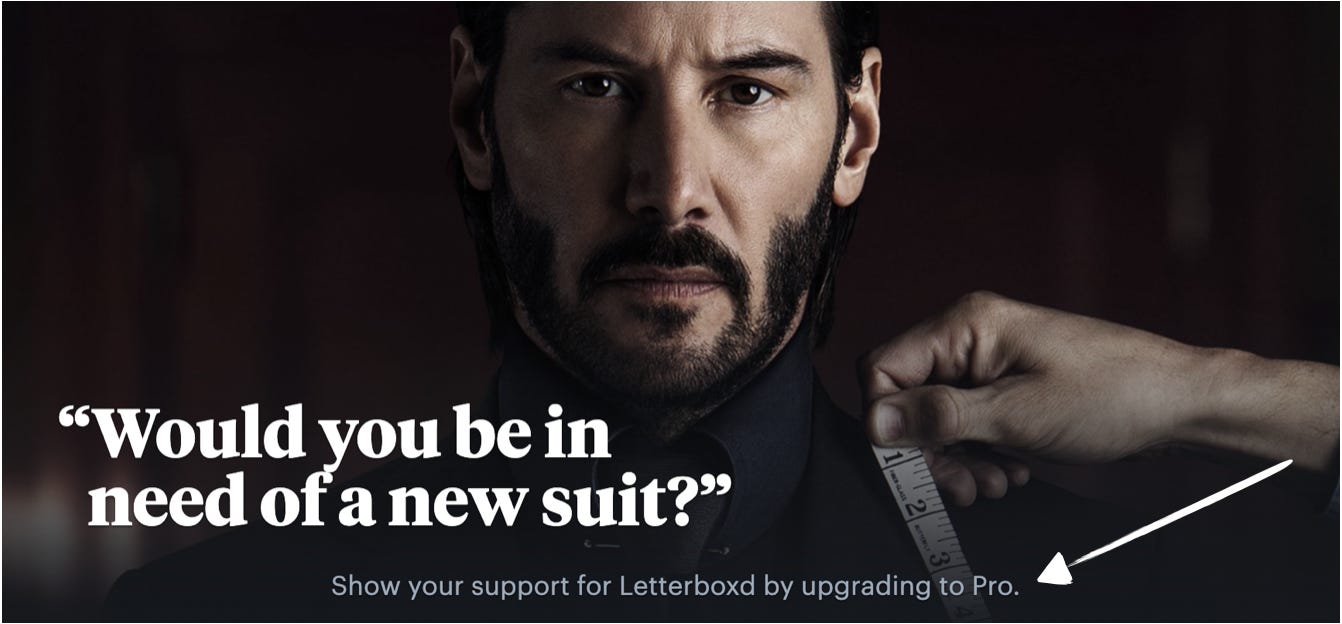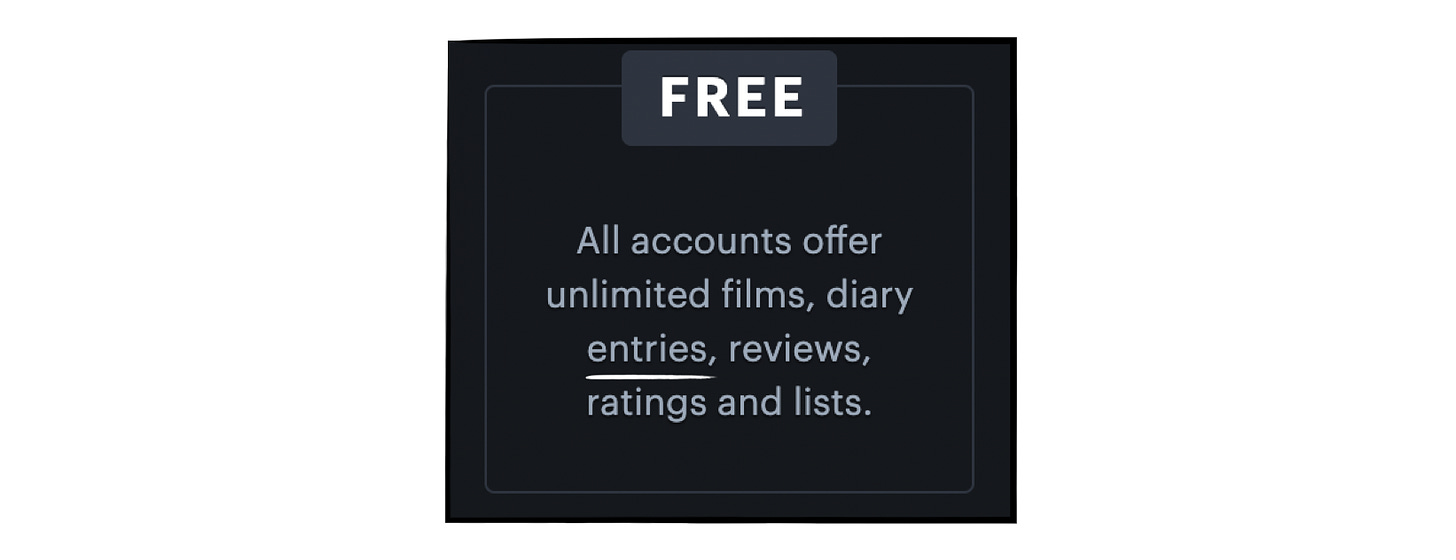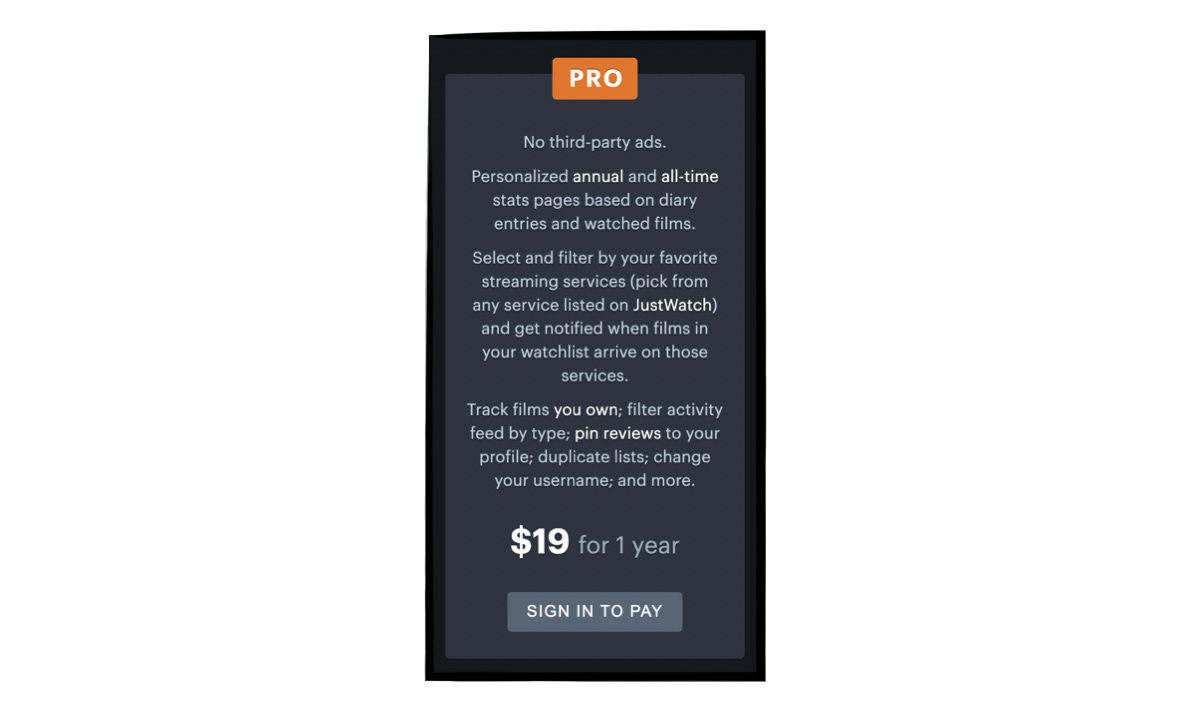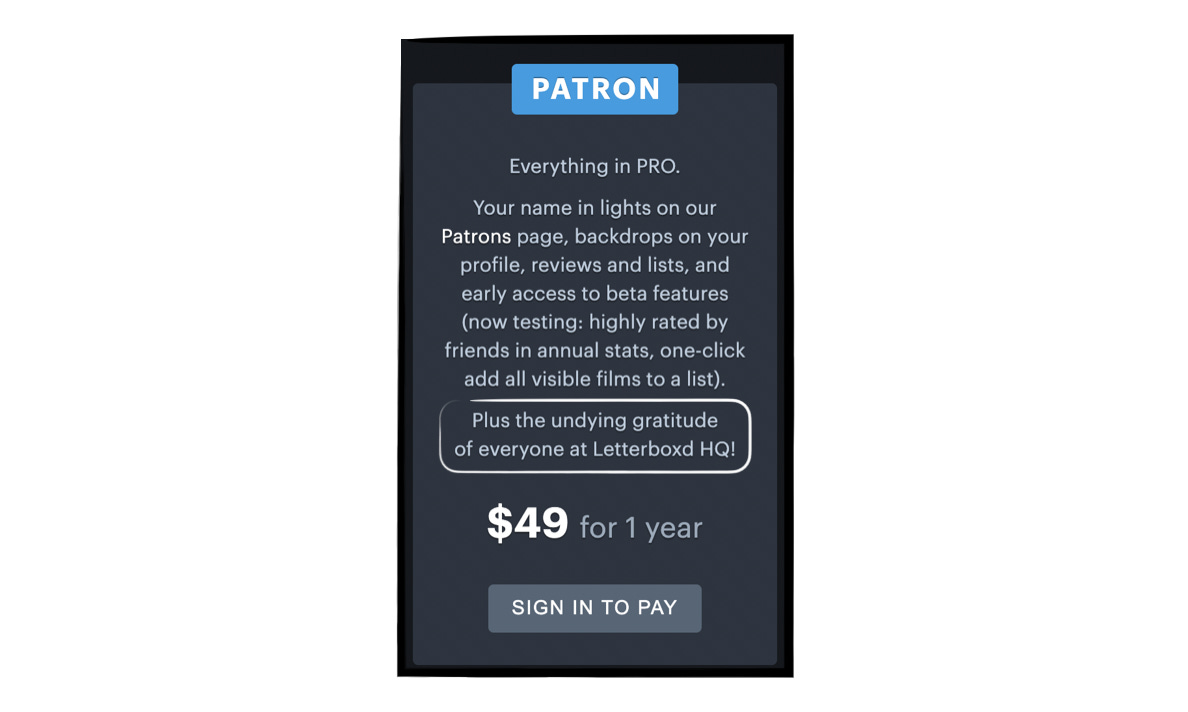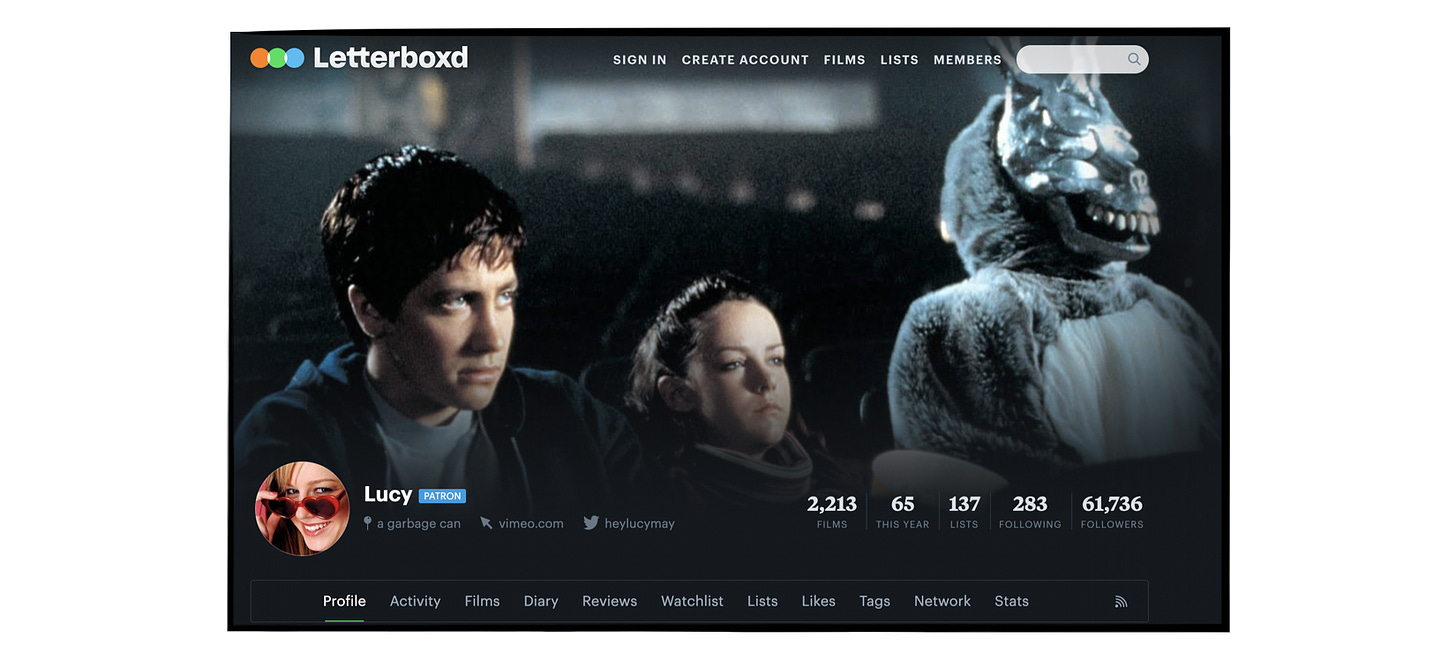Letterboxd and Niche Social Monetization
How Letterboxd uses a generous free plan and optional memberships to grow a thriving niche community.
SaaS Pricing is hard. PricingSaaS is your cheat code.
Monitor competitors, track real-time benchmarks, discover new strategies, and more.
Fun fact about me, I have a bit of an aversion to social media.
A couple years ago, I had a few too many realizations that after opening Instagram, I would end up deep down a rabbit-hole 15 minutes later, not knowing how I got there. Around that time, I read Cal Newport's Digital Minimalism and decided to delete Instagram and Facebook from my phone. After a month or so of checking the Gram on my browser (definitely not how it's meant to be consumed), I gave up, and logged out of both Facebook and Instagram on the desktop.
Since then, I haven't had any exposure to either app other than occasional glances when my wife shares an announcement from one of our friends. Generally, I don't miss it. I don't really know what Facebook is these days, and while I occasionally miss my favorite meme accounts on Instagram, a couple buddies share highlights when something is really good.
Ultimately, I'm not a total digital minimalist. I still use Twitter, but only on the desktop, and I try to actively limit time spent on there as well (I use Freedom). However, there is one social media app that I use without any sense of limitation: Letterboxd.
For the unfamiliar, Letterboxd is basically Goodreads for movies with a better UI. My favorite part is that the app is action-oriented - it's very rare that I find myself wasting time on there.
I typically jump into the app to do one of three things:
Add a movie to my watchlist
Check if a movie I want to watch is currently streaming for free
Log a movie that I just watched
That said, the app is social - albeit in a way that's manageable.
I follow a few people whose taste I appreciate to track what they're watching: Sean Fennessey of The Ringer, Sean Baker (director of The Florida Project, Tangerine), and my brother Jack among others. Sometimes when I open the app, I'll notice a new movie that one of them logged in the New from Friends section, and add it to my watchlist. This section only contains recent reviews and ratings, so it introduces me to new movies without feeding the same endless scroll as Facebook, Twitter, or Instagram.
If there's one activity on Letterboxd that can be a time-suck, it's scanning my watchlist and trying to figure out what to watch. Sometimes this takes a while, but only because my wife and I aren't always in the mood for the same thing. If anything, the app helps us reach consensus faster.
Ultimately, what I love about Letterboxd is that it provides value in and of itself. If there was no social aspect, I'd still use the app for its utility. Besides being a happy user, I'm also a fan of their monetization strategy.
Niche Communities and Monetizing Fun
One pricing trend I've been excited about is the idea of offering core functionality for free, but monetizing additional features for power-users.
I wrote about this strategy extensively in Discord Nitro: Monetizing Fun. Discord and Fortnite are great examples, as both offer core products for free with optional subscriptions that allow power-users to get more value. Letterboxd follows this trend, offering an ad-supported free version with two upgraded plans: Pro and Patron.
Beyond the fierce gaze of John Wick on their pricing page, Letterboxd addresses the monetizing fun philosophy head-on by explicitly referencing Letterboxd patronage. In a sense, they're admitting that you don't need to upgrade, but it'd be pretty cool if you did.
Before diving deep into Letterboxd's paid options, it's worth covering what free users are able to do in the app. In short - almost everything.
Back in 2013, Letterboxd tried to limit lists to 20 films each, but backtracked after users complained. In hindsight, its pretty obvious unlimited usage was the right move. Limiting list size would disincentivize usage, which powers the entire social value proposition. The more films users can add to their lists, the more they'll use the app, which translates to more diary entries, reviews, and context for each film, which means other users have a better chance of discovering something new.
In addition to unlimited activity, free users get access to Letterboxd's integration with JustWatch, which shows where movies are available for streaming.
Earlier, I mentioned the free plan is ad-supported. While the ads don't exactly enhance the experience, they're not terribly annoying either. They generally take the form of retargeting boxes lightly scattered throughout the feed, and aren't too interruptive or invasive.
The inclusion of ads gives Letterboxd their first paid differentiator. By upgrading, users can remove ads from the app altogether. As a recent Pro member, I can attest that it does make the feed feel cleaner.
Besides an ad-free experience, Pro members get access to a range of other features, including personalized stats based on their viewing history and advanced JustWatch capabilities. This includes the ability to pick favorite streaming services, filter films by where they're available, and get notified when a movie on their watchlist is available on a favorite streaming service.
While these features may appeal to the casual movie-viewer, Pro also has features geared toward true cinephiles. This includes the ability to track films that you own in your physical collection and pin specific reviews to your profile. Reviews are a fascinating aspect of Letterboxd in their own right, and a great example of the casual-insider vibe of the app.
A recent New York Times profile highlighted how the app has created a new type of critic. Mike D'Angelo, a longtime critic for Entertainment Weekly and Esquire highlighted how his reviews differ on the platform.
If I’m writing a professional review, I’m writing for a general audience. Whereas on Letterboxd, I don’t worry about pro forma things like plot synopsis. I make jokes and references you would have to have a fairly deep film knowledge to understand. I find it much more liberating.
At $19 per year or ~$1.58 per month, the Pro plan isn't going to break the bank. It's a low-cost way for power-users to take their usage to the next level or simply support the company. Given the low price point, I'd imagine Letterboxd gets plenty of upgrades from casual users as well.
The Patron plan takes the monetizing fun ethos a step further. The name alone emphasizes that by subscribing, you're doing the Letterboxd team a solid. They even reference the "undying gratitude of everyone at Letterboxd HQ" alongside the other benefits of the plan.
The Patron plan is especially reminiscent of Discord Nitro, which allows members to unlock customized banners for their servers (the Discord equivalent to a Slack group or community). Similarly, with the Patron plan, Letterboxd users get to customize the backdrop on their profile.
Again, this is a feature that would probably only interest power-users, which makes sense in the context of the Patron plan. Lastly, Patrons get their name on a distinctive Patrons page, and access to beta features.
Letterboxd and Niche Communities
Last September, Letterboxd announced a new paid offering for film-related organizations called the HQ plan. HQ allows industry organizations like IndieWire, The Black List, and IFC to connect more intimately with hardcore film-buffs and share what they're up to. As noted in the HQ beta announcement, these accounts participate alongside individuals, meaning other users need to follow them to see their activity.
By offering the HQ plan instead of sponsorships for these organizations, Letterboxd is keeping the feed clean and ensuring that users have complete control over the messages they see. This feels like an intuitive next step, and a way to serve higher-value customers without having a negative impact on the user experience. If the HQ plan is successful, I wouldn't be surprised to see Letterboxd eventually get rid of ads altogether. That they still have ads at all is surprising, and I would imagine it's more a relic of the past than anything else.
Letterboxd reminds me of Greg Isenberg's Guide to Unbundling Reddit, which makes a case that there are hundreds of opportunities for successful, independent niche communities hiding in plain sight on Reddit. In his piece, he outlines the following formula to find and unbundle a niche community:
While Letterboxd is likely an order of magnitude above the opportunities Isenberg has in mind here, his formula holds up. The Letterboxd team has built a product tailor-made to the interests of its power-users, and they're continuing to build a better experience over time.
It seems to be working. As noted in the recent NYT profile, not only have users almost doubled since the beginning of the pandemic, but activity per member, and membership revenue have risen as well, suggesting that their formula could serve as a roadmap for similar up-and-coming niche communities.
Enjoying Good Better Best?
If you enjoyed this post, I’d love it if you hit the like button up top, so I know which posts are resonating most!




